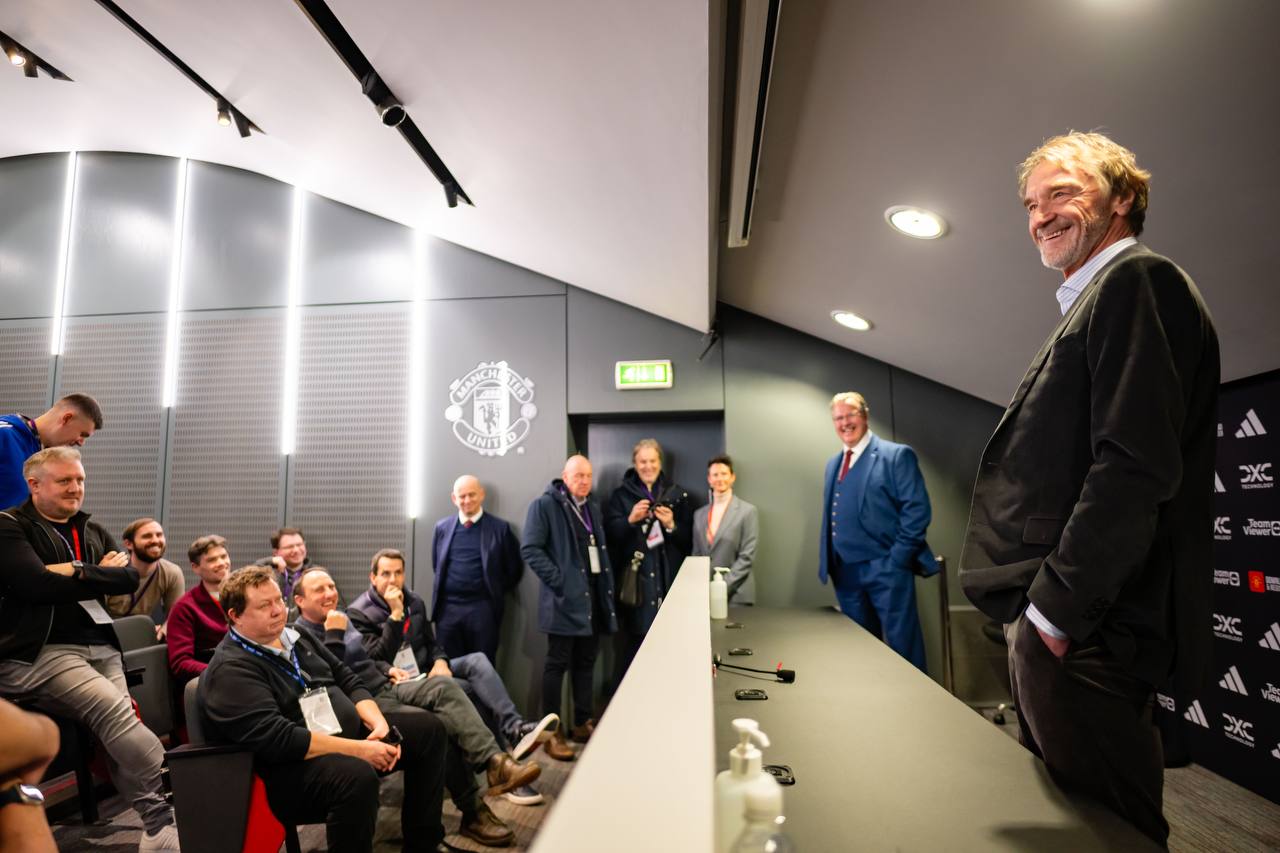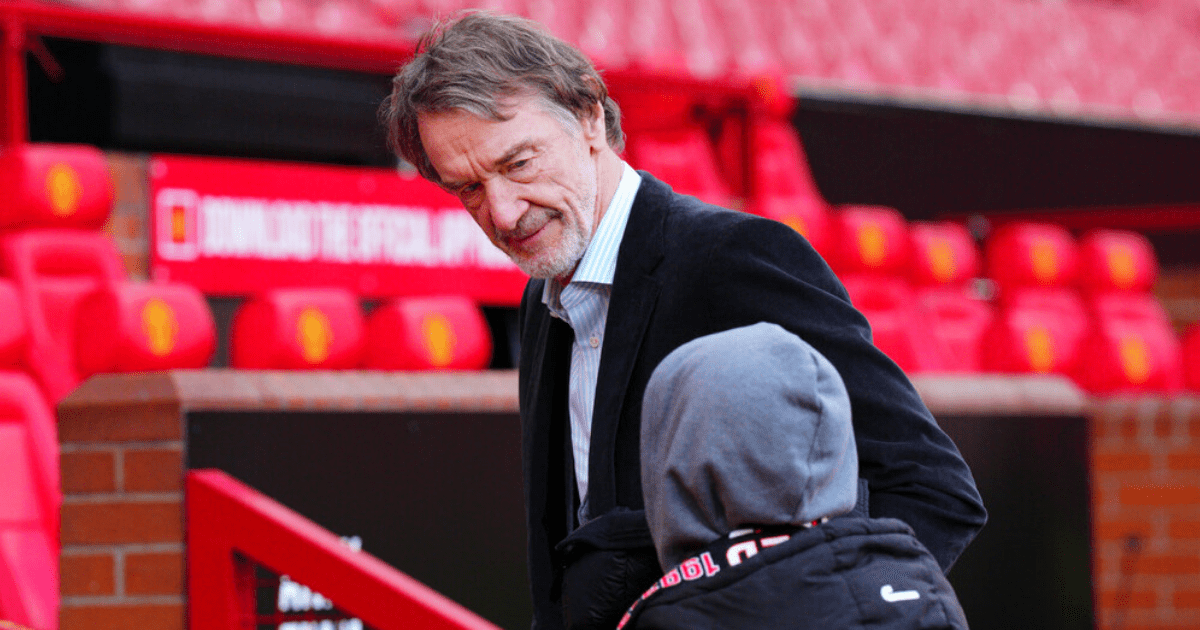INEOS Boss Excited for Control of Football Operations at Manchester United
Sir Jim Ratcliffe, the British billionaire and boss of INEOS, attended his first match at Old Trafford today since it was announced that he would purchase a 25% stake in Manchester United. Ratcliffe expressed his confidence that his control of the footballing side of the club will be ratified by the Premier League within a matter of weeks.
Meeting Staff and Media
Ahead of the game, Ratcliffe walked around the corridors of Old Trafford, meeting with staff and media. However, he was unable to provide many details about his plans for the club, as the Premier League's approval is still pending.
Excitement and Anticipation
Ratcliffe, who has been involved in elite sport with cycling, sailing, and Nice in Ligue 1, described his involvement with Manchester United as the most exciting thing he has ever been a part of. He expressed his enthusiasm for the club, stating that he has been a lifelong fan and named Paul Scholes and Eric Cantona as his favorite players.
Meetings with Manager Erik ten Hag
Although Ratcliffe has already had meetings with manager Erik ten Hag, he declined to provide any details until the formalization of his involvement with the club.

A More Regular Visitor
Despite his other commitments, Ratcliffe stated that he plans to be a more regular visitor to Old Trafford in the future. He acknowledged that he hasn't been to a game in two or three years but expressed his intention to attend more matches going forward.
Frequently Asked Questions
What is the role of a coach in the success of a football team?
A coach plays a pivotal role in a football team’s success through development of training programs, tactical planning, and player management. In addition to preparing effective training sessions and creating strategic game plans, the coach is responsible for motivating players. Coaches must also make critical decisions about the player’s selection and position, while managing dynamics within the group to maintain a focused and positive environment. Their leadership often helps teams overcome challenges and drive them to achieve success.
What are some strategies I can use to keep motivated and focused while improving my football abilities?
Setting clear and attainable goals, and keeping track of your progress is essential to staying motivated and focused. Reviewing performance during training sessions and matches on a regular basis can identify strengths that need to be developed and areas where improvement is needed. Finding a coach or community of players to work with can promote supportive relationships. This will encourage perseverance. Additionally, maintaining a positive mindset and visualizing success can be powerful motivational tools. It is also important to include variety in the training routines in order to keep them interesting, as well as to allow for adequate rest and recovery.
What are essential skills for a good footballer?
To play the best football possible, a player needs to have a mix of technical skills, tactics, physical abilities, and mental capabilities. Technical skills include ball handling, dribbling and passing. Tactical knowledge encompasses understanding of the game, such as positioning, movement, and decision-making. Performance is largely determined by physical attributes like speed, endurance and strength. Finaly, mental toughness and focus are crucial to maintaining performance through a match.
How do I become a competent football goalkeeper
Becoming a proficient goalkeeper requires specialized training focused on reflexes, agility, and positioning. Goalkeepers must be able to stop shots, control the penalty area by punching and catching with ease, and distribute both with their hands and feet. Mental resilience, decision making under stress, and effective communication are all key elements of goalkeeping. Consistent practice, constructive feedback from coaches, and analyzing performances to identify areas for improvement are essential in mastering the art of goalkeeping.
What are some of the best ways to defend against a team with a high offensive level?
To defend against a powerful offensive team, you need a strategic and disciplined approach. The fundamentals of a defensive system include maintaining a compact formation, implementing a disciplined mark-up system, and establishing a solid defense line. By forcing the opposing attackers to the sides instead of the center, you can reduce their chances of scoring. Communication between defenders is key, as are quick defensive transitions when possession has been lost. Counter-attacking can be used as a way to exploit any holes that might open when the offensive team commits their players forward.
Statistics
- A consistent mental focus regimen, including visualization techniques, can enhance player concentration levels by up to 20% during matches.
- Goalkeepers who engage in specialized reaction-time training reduce their goals-conceded tally by an average of 25% over a season.
- Teams that prioritize teamwork in training sessions increase their passing accuracy by an average of 15% in competitive matches.
- Players with a balanced diet containing adequate macronutrients have a 30% lower injury rate than those with less balanced nutritional habits.
- Coaches who engage in continuous professional development contribute to a 40% better win ratio for their teams.
External Links
topendsports.com
ussoccer.com
nscaa.com
fifa.com
fai.ie
How To
How to be an effective captain in a football team
For you to effectively lead a soccer team, you need to embody qualities of a great leader. These include strong communication, honesty, and decisiveness. In both your training and game performance, always set an example. Foster team unity through building relationships and understanding teammates’ strengths and motivations. Be the bridge between the coach and the team, facilitating clear and constructive dialogue. Learn how to resolve conflicts diplomatically and create an environment where teamwork, collective success and individual recognition are valued over each other.

